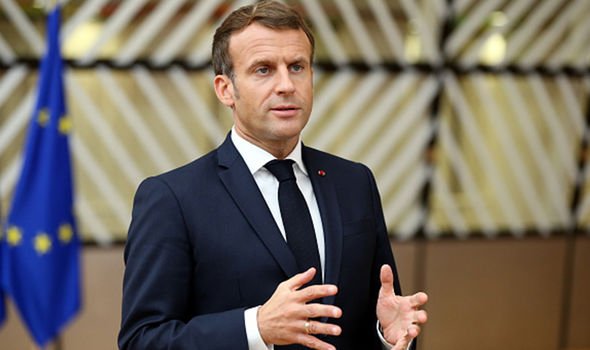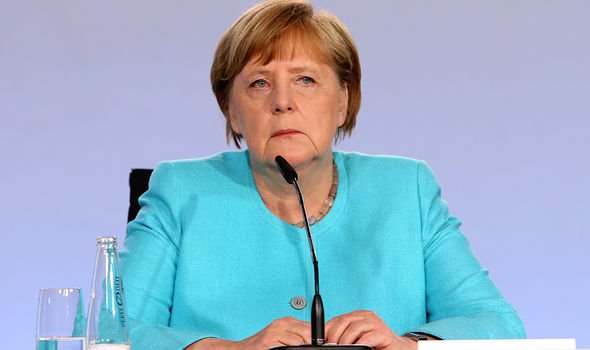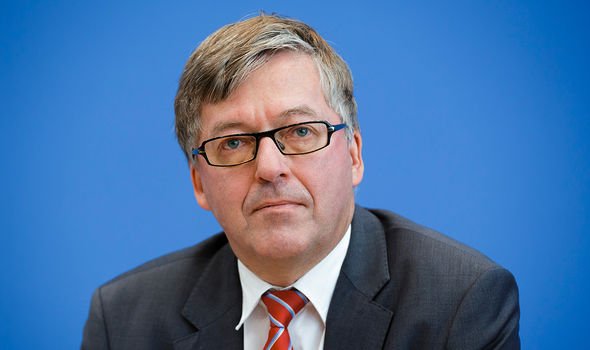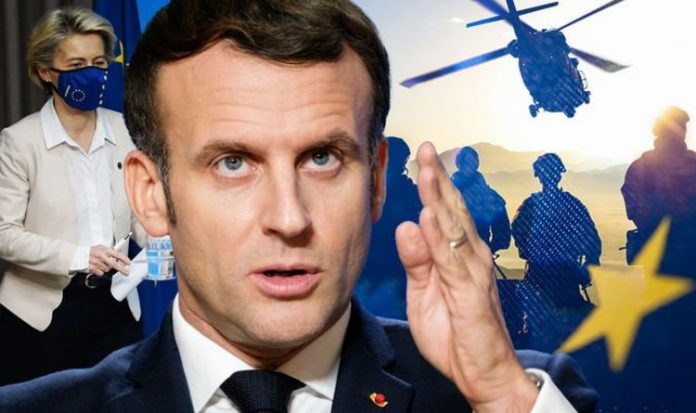Macron and France ‘are failing’ on vaccine rollout says Moutet
Together with France, the UK is Europe’s top military power. It is a nuclear power and a member of the United Nations Security Council. However, the last-minute post-Brexit deal reached on December 24 does not include any chapters on foreign policy or defence, leaving the door wide open for bilateral cooperation.
The European Commission said in a statement: “Foreign policy, external security and defence cooperation is not covered by the Agreement as the UK did not want to negotiate this matter.
“As of January 1, 2021, there will therefore be no framework in place between the UK and the EU to develop and coordinate joint responses to foreign policy challenges, for instance, the imposition of sanctions on third-country nationals or economies.”
Britain is said to have already started negotiating a post-Brexit military cooperation deal with Spain.
France, on the other hand, does not seem to have started such discussions with London, even though French President Emmanuel Macron was specifically told before his election that maintaining defence ties with Britain was crucial and “more important” than EU military integration.

Macron’s leaked emails show Brexit Britain ‘more important to France than flawed EU’ (Image: GETTY)
A trove of 20,000 emails allegedly stolen from Mr Macron’s campaign headquarters in 2017, showed some of his senior advisers arguing for continued British involvement in European defence projects, while highlighting divisions between Paris and Berlin on EU defence co-operation.
The behind-the-scenes advice, which dates back to before Mr Macron’s presidential win, painted a stark contrast with Brussels’ claims that Brexit could have opened the door to a new golden age of EU defence co-operation.
One of the emails, sent by Hervé Grandjean, who at the time was Mr Macron’s industrial affairs advisor and a defence specialist, contained a report on the future of Franco-British defence relations after Brexit.
The report, written by Alice Pannier, a European security expert, warned that France would be “caught between the temptation to seize Brexit to advance the CSDP [the EU’s common defence plans] and the desire to maintain a critical mass of exchanges with the British, who…remain the most important and the most active country in the field of defence”.
Ms Pannier added: “Brexit will necessarily have potentially contradictory effects on bilateral cooperation.
“Both governments have insisted on the preservation and strengthening of the bilateral partnership.”
The President’s speechwriter Quentin Lafay replied and copied in another senior advisor to Mr Macron, Clément Beaune, to help shape the-then candidate’s policy.
JUST IN: Brexit fury as EU judges’ orders will be enforceable in UK

French President Emmanuel Macron (Image: GETTY)

German Chancellor Angela Merkel (Image: PA)
In another email dated October 3, Mr Macron’s former defence advisor, François Heisbourg, talked about EU plans for closer integration of European defence forces.
He delivered a poor assessment of the “overly ambitious” proposals, comparing them unfavourably to the eurozone, saying they are “a bit like a single currency that would like to live without either a central bank or an economic government.”
He warned the Germans were reluctant to fund joint military projects and earlier attempts by previous French leaders failed to convince them.
He wrote: “The Germans have evolved a lot on defence but they pay for their projects with their money. They are not ready to entrust to us, directly or through the EU, the keys to the safe.”
He noted that the plans will “only have a chance to work in the context of a general revival of the European Union, in a federal sense, on all fronts,” adding that this appears unlikely.
In Mr Beaune’s reply, he also acknowledged that France “could be tempted” to prioritise bilateral cooperation with Britain over the EU plans.
Mr Macron’s party, La République En Marche, declined to comment on the email exchanges at the time, and reiterated warnings that some of the emails in the cache could have been fakes.
DON’T MISS:
India to ‘change position’ in trade talks with EU after Brexit deal [ANALYSIS]
Brussels to ‘block Scotland’s EU entry for fear of having Greece 2.0′ [EXCLUSIVE]
Brexit deal betrayal as ‘crucial section’ missing from text to benefit [REVEALED]

Minister for European Affairs Clement Beaune (Image: LES EUROCITOYENS)

UK’s military power (Image: EXPRESS.CO.UK )
A spokesman said: “These emails were obtained and published illegally. We are not going to comment on whether specific emails are false.”
Since the emails were written, the EU seems to have pushed on with military reforms aided by the backing of of Mr Macron, although deep differences on how so-called “permanent structured co-operation” or PESCO remain.
In November, a working group on Security and Defence Policy of the SPD ‒ Germany’s second-biggest political party ‒ published a plan to create a 28th EU Army.
The force would be directly subordinated to the European Commission and would be under the responsibility of a newly-appointed Commissioner for Defence.
Fritz Felgentreu, Defence policy spokesman for the SPD parliamentary group, said: “Our aim is to improve the EU’s ability to act, regardless of the tiresome questions of sovereignty.”
The SPD is one of the two major contemporary political parties in Germany along with the Christian Democratic Union of Germany (CDU).
The head of Oxford-based think-tank Euro Intelligence Wolfgang Munchau argued that their 12-page paper revealed a “shocking lack of understanding” of the EU’s security priorities in the early 21st century.
Mr Munchau wrote: “Probably the least helpful proposal you can make to help the EU move in the direction of strategic autonomy is to call for a European Army.
“The problem is not only that it sets the bar too high, which it does. It also diverts attention from the security discussion the EU needs to have instead.

President of the European Commission Ursula von der Leyen (Image: GETTY)
Macron criticised over push for EU army by Italian MEP
“This is one of those ideas where you don’t know where to begin dismantling it. Our first thought was this: are they trying to do to defence what they did to the eurozone?”
Mr Munchau claimed that with the monetary union, the bloc ended up creating a dysfunctional system in the vague hope that future generations would fix it.
He added: “Have they considered what might happen if the European Commission charged into battle and lost? The British are still traumatised by the Charge of the Light Brigade in the Crimean War.
“An army is not an inter-institutional working group that meets on Tuesdays.”
He concluded: “The paper also reveals a shocking lack of understanding of the EU’s security priorities in the early 21st century.
“The biggest threats to our security right now do not stem from invasion by a foreign power, or our refusal to participate in a war in the Middle East or Africa.

Hans-Peter Bartels, a former national defence commissioner (Image: GETTY)
“Our list of priorities would include the following: defence against cyber threats from Russia and China; a restoration of the Iran nuclear deal; the co-ordination of the fight against terrorism; the push against empire-building in our neighbourhood; and a defence of EU companies and individuals targeted by the US for secondary economic sanctions.
“It is rather difficult to think of an EU security interest for which you would need a European Army.”
Despite Mr Munchau’s claims, according to one of Germany’s most senior defence officials, the creation of an EU Army is now pretty much inevitable.
In 2017, Hans-Peter Bartels, a former national defence commissioner, called for NATO’S EU members to organise their forces into a single unit.
Mr Bartels said: “We are currently disorganised, technically fragmented and duplicate structures unnecessarily.
“We do not want to go down the solitary national path any more.
“Not in Germany, not in the Netherlands, not in the Czech Republic and not in Italy.
“Every step in the right direction is important.
“In the end, there will be a European Army.”







